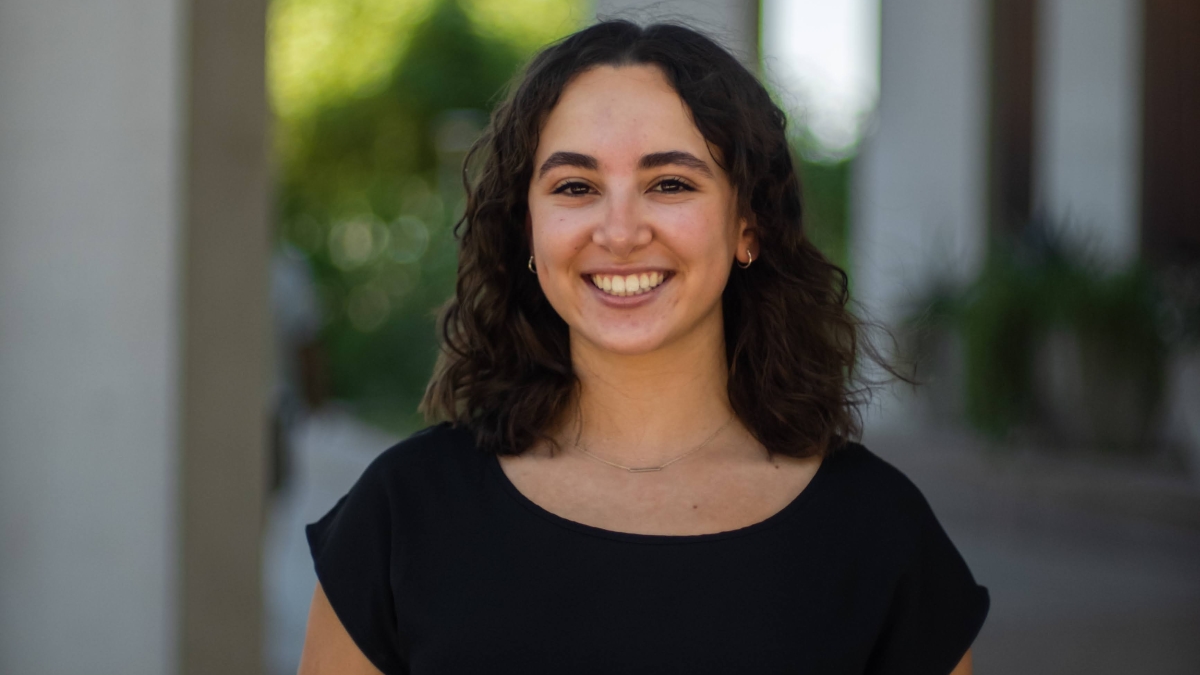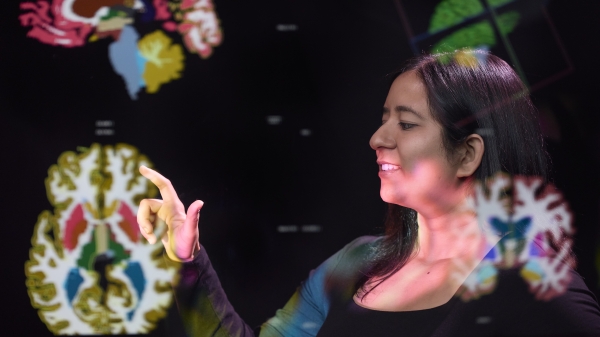Neuroscience student wins award for research on impact of hormones on memory, cognition

Jade Pastor is a junior studying neuroscience at Arizona State University. Photo courtesy the ASU Department of Psychology
When she enrolled at Arizona State University, Jade Pastor wasn’t really sure what she wanted to study. She started out as a biology major on the pre-med track, but soon discovered the Behavioral Neuroscience of Memory and Aging research lab, and her passion for neuroscience was ignited.
Now, as a junior majoring in the field in ASU’s Department of Psychology, Pastor has had the chance to conduct hands-on research in the highly selective lab, led by ASU President’s Professor Heather Bimonte-Nelson, and has worked on projects with graduate mentors that actively contribute to groundbreaking research on hormones and memory.
Recently, a project of Pastor’s placed second nationally at the Emerging Researchers National (ERN) Conference in Science, Technology, Engineering and Mathematics (STEM) in Washington, D.C. The project focused on how cognitive outcomes are associated with hysterectomy and questioned whether menopause history could impact the interpretation of the effects.
“Understanding how hysterectomy, combined with varied menopausal backgrounds, alters the brain and its function is vital for understanding the trajectory of neurocognitive changes across age in the female,” Pastor said.
The ERN Conference is hosted by the American Association for the Advancement of Science (AAAS), Inclusive STEM Ecosystems for Equity and Diversity (ISEED) and the National Science Foundation (NSF). Pastor and fellow undergraduate Kieran Andrew both received travel awards and presented their research posters, competing with over 6,000 other undergraduate presenters.
Pastor credits her experience in the Behavioral Neuroscience of Memory and Aging lab for her research success.
“I just love the process of coming up with a plan for the research that you're doing and implementing. The experience has been invaluable, and learning from our lab's amazing, talented members has been great,” Pastor said. “Additionally, it's been a very enriching experience. I wouldn't be where I am today without Heather. She pushes me out of my comfort zone in the best way possible and I’ve grown so much because of her.”
Bimonte-Nelson is equally as full of praise for Pastor.
“One of the joys of mentoring Jade is that she has an extremely positive attitude about learning new things. … She is consistently prepared for every single meeting we have, she continuously reads the literature and protocols so that she can contribute extensively in team and one-on-one meetings, and it has been wonderful to hear the positive trajectory of her proactive voice as she is growing into her role as an independent critical thinker and scientist,” Bimonte-Nelson said.
The Bimonte-Nelson behavioral neuroscience lab aims to understand the link between hormones and memory during the process of aging, such as examining the long-term impact of hysterectomy on memory. Additionally, the lab is a champion of underrepresented researchers, including first-generation college students and women, and hopes to change the trajectory of their lives through research experience.
“My favorite part about conducting research in the Bimonte-Nelson lab is the implications of our findings on women's health. I feel like the research that we're doing is actually making a difference in improving the understanding of hormones and menopause,” Pastor said.
Long term, she hopes to continue her graduate education with a focus on neuroendocrinology. Recently, she received a scholarship through the German Academic Exchange Service (DAAD) Research Internships in Science and Engineering (RISE) program to intern at the University of Lübeck in Germany over the summer, where she will be conducting research to observe the impact of shift work on the progression of autoimmune diseases.
If Pastor was to be given an unlimited research budget, she would like to focus research on how hormonal contraceptives impact bone density in adolescents and young women.
“It is super important because not all of these contraceptives have been fully assessed yet and there are certain health risks that aren't fully understood,” she said. “It's been analyzed mostly in women of older ages, but I would like to see what the impact would be for more women my age.”
A piece of advice that Pastor has for fellow students is just to get going and get involved.
“I would start out by reaching out to your professors, especially those in the classes that you're most interested in, and seeing what research they're involved in. Even if their research isn't the right thing for you, they can point you in the right direction by referring you to other professors,” she said. “I would also recommend getting started in any lab that you can. That way you can get some basic experience, and from there, you can branch out to ones that better match your interests."
More Science and technology

How ASU is reshaping manufacturing training
The manufacturing sector faces a persistent challenge: a shortage of skilled workers.As industries adopt emerging technologies,…

Podcast explores the future in a rapidly evolving world
What will it mean to be human in the future? Who owns data and who owns us? Can machines think?These are some of the questions…

New NIH-funded program will train ASU students for the future of AI-powered medicine
The medical sector is increasingly exploring the use of artificial intelligence, or AI, to make health care more affordable and…